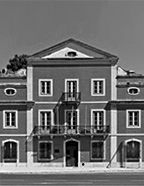

................................
In compliance with Art. 24 of the same Statutes, the Minister also appointed the first twenty five founding member academics, including those elected for the Council: Abel Fontoura da Costa, Alfredo Pimenta, António Augusto Esteves Mendes Correia, Augusto da Silva Carvalho, Carlos Malheiro Dias, Damião Peres, Fernando Martins de Carvalho, Francisco Rodrigues, Henrique de Campos Ferreira Lima, Joaquim Bensaúde, Jordão Apolinário de Freitas, José Leite de Vasconcelos Pereira de Melo, José Maria de Queiroz Veloso, José Maria Rodrigues, Júlio Dantas, Luís Teixeira de Sampaio, Manuel Paulo Merêa, Marcelo José das Neves Alves Caetano and Reinaldo dos Santos. Augusto Botelho da Costa Veiga, Augusto Vieira da Silva, Caetano Beirão, José Justino Teixeira Botelho and Serafim Leite would be appointed at a later stage. Also by statutory provision, the Portuguese Academy of History was to include 10 Brazilian Academics. To such end, Afonso Celso de Assis Figueiredo (Count Afonso Celso) Afonso d’Escragnolle Taunay, Artur Guimarãis de Araújo Jorge, Francisco José de Oliveira Viana, Gustavo Barroso, Júlio Afrânio Peixoto, Manuel Cícero Peregrino da Silva, Max Fleiuss, Pedro Calmon Moniz de Bittencourt and Rodolfo Garcia were appointed.
Accomplishing the mission entrusted to them, the academics soon became concerned about the importance of preparing publications, and a meeting of the entire Academy was planned to discuss the possibilities, resulting in a proposal for publications to be presented, which would be sent to the Ministry on 26 March. At the same time, António de Vasconcelos sent the following telegram to the President of the Council: "I congratulate Your Excellency on your very bright idea for the solemn patriotic celebration of the 100th anniversary of the foundation and restoration of Portugal in the next 1939-1940 biennium, both of which converge in the same meaning of national independence. The draft programme is highly impressive and very timely, and all Portuguese citizens should join ranks with the government, cooperating effectively in this new and essential undertaking of the Estado Novo [New State]. In the certainty that my words also express the thoughts and wishes of my colleagues of the Portuguese Academy of History, I take the liberty to congratulate Your Excellency and express, on their behalf, the desire for cooperation, particularly in the historical publications referred to in the programme - António Ribeiro de Vasconcelos, President of the Portuguese Academy of History.
